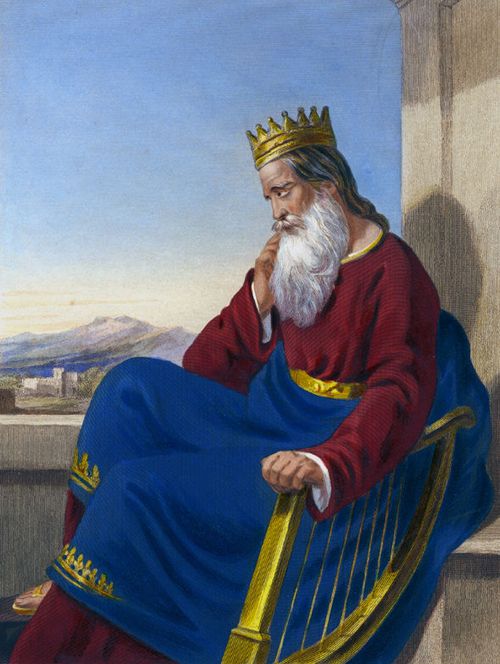Psalm 16:8-10
I have set the LORD always before me; because he is at my right hand, I shall not be shaken. Therefore, my heart is glad, and my whole being rejoices; my flesh also dwells secure. For you will not abandon my soul to Sheol, or let your holy one see corruption.
Acts 13:32-37
“And we bring you the good news that what God promised to the fathers, this he has fulfilled to us their children by raising Jesus, as also it is written in the second Psalm, ‘You are my Son, today I have begotten you.’ And as for the fact that he raised him from the dead, no more to return to corruption, he has spoken in this way, ‘I will give you the holy and sure blessings of David.’ Therefore, he says also in another psalm, ‘You will not let your Holy One see corruption.’ For David, after he had served the purpose of God in his own generation, fell asleep and was laid with his fathers and saw corruption, but he whom God raised up did not see corruption.”
1 Kings 1:1-2
“Now King David was old and advanced in years. And although they covered him with clothes, he could not get warm. Therefore, his servants said to him, ‘Let a young woman be sought for my lord the king, and let her wait on the king and be in his service. Let her lie in your arms, that my lord the king may be warm.’”
First Kings begins wrong. Or so it seems. It begins with King David old, and on his death bed. By chapter two, he’ll be gone. It’s not supposed to begin that way. At the end of Genesis, Jacob, the youngest of the Big Three (Abraham, Isaac, and Jacob) “goes the way of all the earth” (dies). At the end of Deuteronomy, Moses dies. At the end of Joshua, Joshua dies. At the end of 1 Samuel, King Saul dies. But, here at the outset of Kings, King David dies. What are we to make of this oddity?
In ancient times, a king was supposed to be strong. And part of the strength formula was being virile. What we see here is the king’s staff testing to see if the king was still worthy of leading. They put out an ad for a beautiful girl to pair up with the king. Obviously, David was not up to the task. This is why Adonijah is introduced the way he is (1:4-5): “The young woman [Abishag] was very beautiful, and she was of service to the king and attended to him, but the king knew her not. Now Adonijah the son of Haggith exalted himself, saying, “I will be king.’” It was as if he says, “Hah, dad’s old and infirm and not worthy to be king. Here’s my opportunity!”
In 2 Samuel 7, the prophet Nathan relayed an incredible promise to King David. David wanted to build a “house” for God, but God had other plans: “David, I will build a “house” for you! See 2 Sam. 7:12-16— “When your days are fulfilled and you lie down with your fathers, I will raise up your offspring after you, who shall come from your body, and I will establish his kingdom. He shall build a house for my name, and I will establish the throne of his kingdom forever. I will be to him a father, and he shall be to me a son. When he commits iniquity, I will discipline him with the rod of men, with the stripes of the sons of men, but my steadfast love will not depart from him, as I took it from Saul, whom I put away from before you. And your house and your kingdom shall be made sure forever before me. Your throne shall be established forever.”
King David would die. He would be buried. He would see corruption. His son, Solomon would build a house for God. But he would die, too. His sons thereafter would rule the southern kingdom of Judah, and true to the prophecy-promise made in 2 Samuel 7, they would be disciplined with “the rod” of the Assyrians, the Babylonians, and sundry other enemies. But God promised David that his steadfast love would never be taken away as he had taken it from Saul. He promised that his throne would be established forever.
This is what Paul declares in Acts 13 – that the son of David who would not see corruption is Jesus the Christ. God “raised him from the dead, no more to return to corruption, he has spoken in this way, ‘I will give you the holy and sure blessings of David[!]’” I think it’s so intentional the way Kings begins. David was a man after God’s own heart. He was a valiant warrior, and he tangibly established God’s People as a Kingdom of Priests. But, as so many of his psalms lament, he was but a fallible human ruler. The ultimate, complete deliverance of God’s People would have to come through a Greater Son of David. David’s quick demise in the opening of Kings is but a subtle literary reminder that earthly kings die. All of this book yearns for that Greater Son to come.
Even as we come to the end of the Story in 2 Kings 25:27-30, the last king of Judah, Jehoiachin, is in Babylonian Exile, but now released from prison and dining like a king at the king’s table. The message is— the Davidic hope is still alive, even as all previous sons of David now see corruption.
Perhaps the best way to understand Kings strange, unorthodox opening is that in the king’s death, we look for resurrection!


